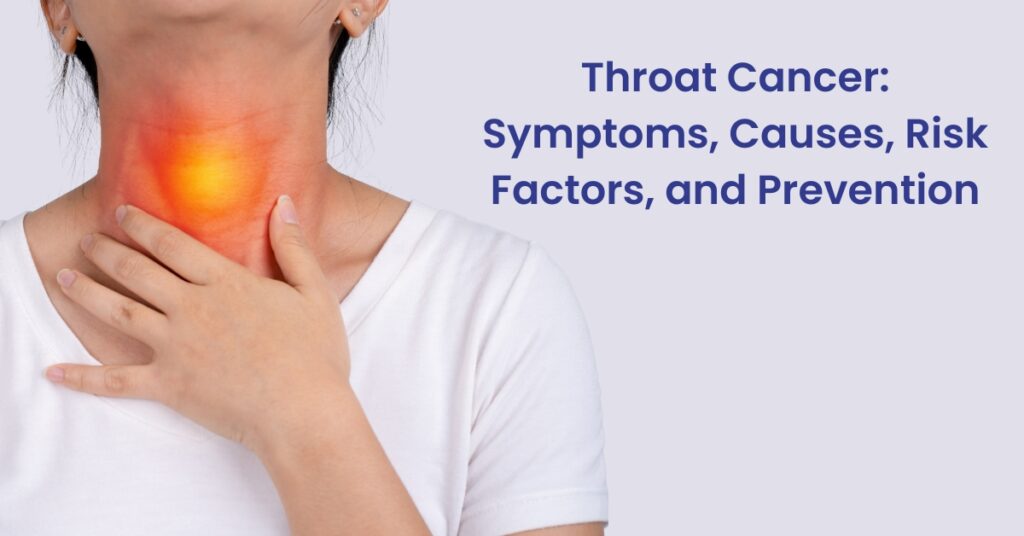Throat Cancer: Symptoms, Causes, Risk Factors, and Prevention

Throat cancer is a dangerous but preventable disease. Understanding its symptoms, causes, and risk factors is critical for early discovery and appropriate treatment. Individuals who live a healthy lifestyle and seek medical counsel when symptoms occur can dramatically reduce their risk and improve their chances of successful treatment. If you or someone you know is suffering symptoms of throat cancer, do not hesitate to seek competent medical help. Early intervention is critical to improving outcomes and quality of life.
What is throat cancer?
Throat cancer is defined as malignant tumors that occur in the pharynx (throat), larynx (voice box), or tonsils. It is a dangerous condition that can impair a person’s ability to communicate, eat, and breathe.
Throat cancer are of three types, including:
- Pharyngeal cancer: It is cancer of the pharynx, which is a hollow tube that runs from below the nose to the top of the esophagus and trachea.
- Laryngeal Cancer: Cancer of the larynx, which contains the vocal cords and is necessary for speaking.
- Tonsil cancer: Cancer that develops in the tonsils, which are located in the back of the throat.
Did you know that throat cancer can manifest in rare ways, such as causing ear pain without any signs of infection or injury? Consult an expert today.
What are the symptoms of throat cancer?
Early symptoms of throat cancer can be subtle and often resemble those of less serious conditions. Key symptoms include:
- Persistent sore throat
- Hoarseness or voice changes
- Difficulty swallowing
- Unexplained weight loss
- A lump in the neck or throat
- Chronic cough
- Breathing difficulties
If these symptoms linger for more than a few weeks, you should see a doctor for a full evaluation.
What causes throat cancer?
Throat cancer develops when cells in the throat undergo genetic abnormalities, causing them to grow uncontrollably and form tumors. Several causes may contribute to these genomic alterations, including:
- Tobacco: Tobacco usage is a leading cause of throat cancer. Tobacco’s toxic chemicals can damage the DNA in throat cells, causing mutations and cancer.
- Alcohol: Excessive alcohol use can harm the cells of the throat, making them more vulnerable to cancer. Alcohol can serve as an irritant, harming throat cells and eventually causing genetic abnormalities.
- Human Papillomavirus (HPV): Certain HPV strains, a sexually transmitted virus, have been associated to throat cancer, particularly oropharyngeal carcinoma. HPV can induce alterations in the cells of the throat, eventually leading to cancer.
- Poor Diet: A diet low in fruits and vegetables may raise the risk of throat cancer. The nutrients in these foods can help protect cells from damage and mutations. Diets deficient in vitamins and minerals might decrease immune responses and increase cancer risk.
- Environmental exposures: Working with asbestos, wood dust, or certain chemicals increases the risk of developing throat cancer. These substances can be inhaled or ingested, leading to damage in the cells of the throat. Prolonged exposure to such chemicals can cause mutations and increase the likelihood of cancer development.
What are the risk factors of throat cancer?
Several risk factors can increase the likelihood of developing throat cancer:
- Age: Throat cancer is more common in people over the age of 50. As people age, their cells accumulate more mutations, which can lead to cancer.
- Gender: Men are more likely than women to develop throat cancer. This may be due to higher rates of tobacco and alcohol use among men.
- Family History: A family history of throat cancer or other cancers can elevate the risk. Genetic predispositions can make individuals more susceptible to cancer.
- Viral Infections: Infection with HPV or Epstein-Barr virus (EBV) is associated with a higher risk. These viruses can cause changes in throat cells, leading to cancer.
- Chronic Acid Reflux: Long-term acid reflux or gastroesophageal reflux disease (GERD) can damage the throat lining. Continuous irritation and damage from stomach acid can lead to cell mutations and cancer.
How can throat cancer be prevented?
While not all cases of throat cancer can be prevented, certain lifestyle changes can significantly reduce the risk:
- Quit Smoking: Avoid all forms of tobacco use. Smoking and chewing tobacco are major risk factors for throat cancer.
- Limit Alcohol Consumption: Drink alcohol in moderation, if at all. Excessive drinking can increase the risk of throat cancer.
- Eat a Healthy Diet: Incorporate plenty of fruits and vegetables into your diet. A balanced diet boosts your immune system and helps protect against cancer.
- Practice Safe Sex: Reduce the risk of HPV infection by practicing safe sex and considering the HPV vaccine. HPV is linked to oropharyngeal cancer.
- Regular Check-Ups: Regular medical and dental check-ups can help detect early signs of throat cancer. Early detection significantly improves treatment outcomes.
Conclusion
Understanding throat cancer, from definition and symptoms to causes, risk factors, and prevention, is critical in the fight against this illness. While we cannot change some characteristics, such as age or gender, we may make decisions that dramatically reduce our risk. Quitting smoking, drinking less alcohol, eating a nutritious diet, practicing safe sex, and getting regular check-ups are all things we can do to protect ourselves. Early detection and prevention are critical, and can make a significant difference. By keeping aware and proactive, we can protect our health and help those around us enjoy healthier, cancer-free lives. Remember that even little steps can make a significant difference.
References:
- https://www.mayoclinic.org/diseases-conditions/throat-cancer/
- https://my.clevelandclinic.org/health/diseases/23136-throat-cancer
- https://www.healthline.com/health/cancer-throat-or-larynx
About Author
Dr. A. Venugopal
MD (General Medicine), DM (Medical Oncology), MRCP – SCE Medical Oncology (UK), ECMO (Switzerland).
Dr A. Venugopal is One of the best medical oncologist and Hemato Oncologist in hyderabad, currently serving as the Head of the Department and Senior Medical Oncologist, Hemato Oncologist at Pi Health Cancer Hospital in Gachibowli, Hyderabad. He brings over 15 years of extensive experience in the field of Oncology.

